Inside Sirhan Sirhan's 50-year quest for freedom after assassinating Robert F. Kennedy
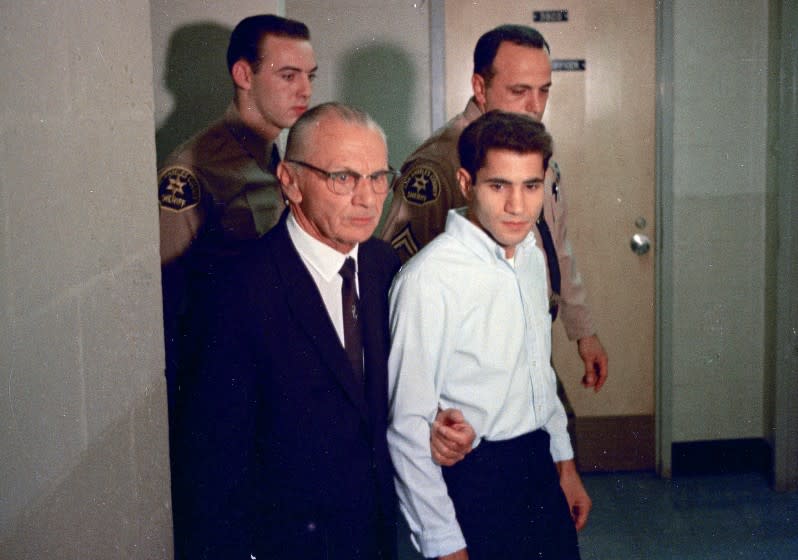
- Oops!Something went wrong.Please try again later.
There was never really a question about whether Sirhan Sirhan killed Robert F. Kennedy in 1968.
He admitted to opening fire, and there were multiple witnesses to the terror at the Ambassador Hotel. Earlier he had written a manifesto calling for Kennedy’s death.
But for decades now, Sirhan has tried to gain freedom, using a variety of arguments. And along the way, his cause has gained some unexpected supporters, along with conspiracy theories.
Yet time after time, the Parole Board rejected his requests. Until Friday.
The board recommended his release Friday, in part after receiving letters of support from two members of the slain senator’s family, including his son, Robert F. Kennedy Jr. The move sparks a 120-day review period by parole staff. After that, Gov. Gavin Newsom — or whoever might replace him in next month’s recall election — could still decide to block Sirhan’s release.
Here is a look at the 50-year road to this moment:
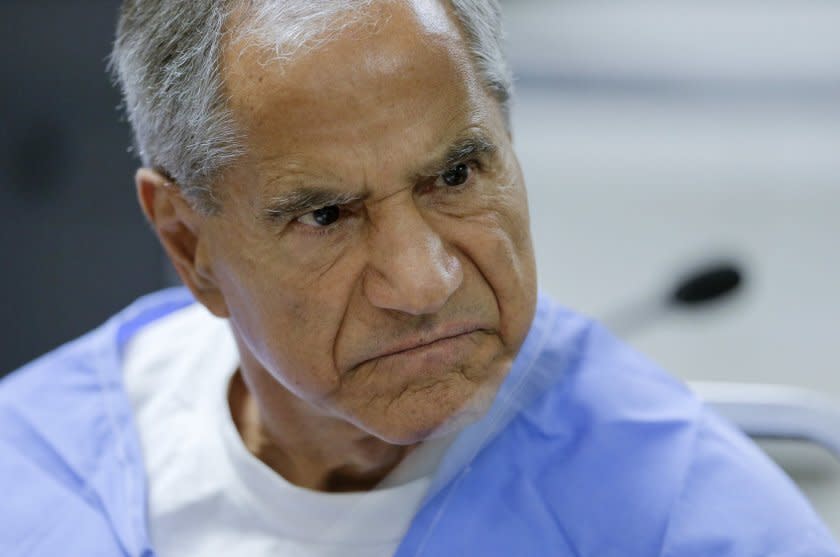
A shocking assassination
Sirhan shot Kennedy on June 5, 1968, moments after the New York senator had claimed victory in the California presidential primary.
Sirhan was convicted and sentenced to death in April 1969. The sentence was commuted to life in prison with the possibility of parole when the death penalty was outlawed in California in 1972 before being re-instituted.
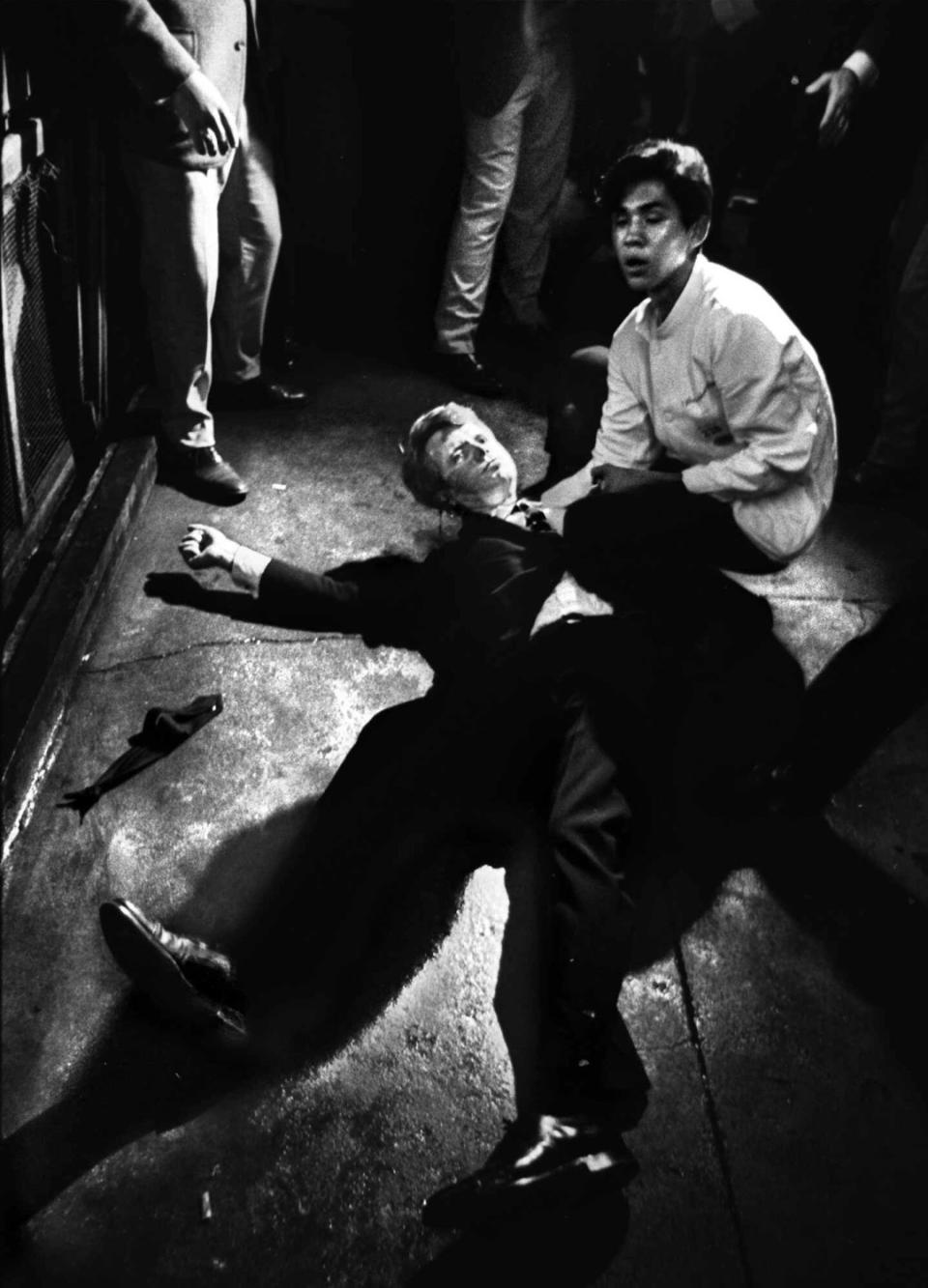
The late Times photographer Boro Yaro witnessed the assassination and described it this way:
When the shooting started I thought someone was tossing firecrackers because I was being hit in the face with debris. I grew up playing with fireworks, and this was not an unusual thing to happen.
Then the crowd parted, and I watched in horror as Sirhan emptied his revolver at Robert Kennedy. I had my camera at chest level, but I didn't make a photo during the shooting. It was dark, and I think I was afraid.
When the shooting stopped there was a pregnant pause, and then two men, one in a tuxedo, grabbed Sirhan and forced him face down on a metal countertop and shook his revolver loose.
Sirhan kept trying to reach the revolver, and I was afraid he might get it, so I stuck my hand in under the guys holding him and picked up the gun.
I turned away from the scuffle and was thinking, "It's warm. The gun is warm," and all of a sudden it was taken from me. I didn't see who grabbed it, but I saw the back end of a sport coat and figured it might be a cop.
When I turned back to the scene, RFK was slowly sinking to the floor, and I realized I had better make pictures.
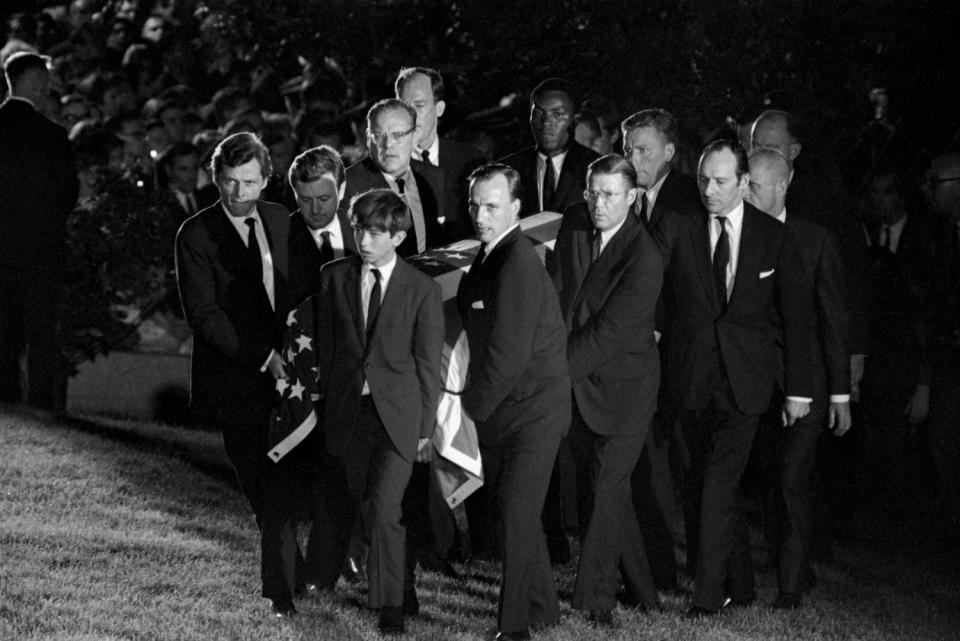
Sirhan Sirhan's claims
In 1985, The Times published an in-depth series of interviews with Sirhan Sirhan, in which he took responsibility for the assassination and said there was no conspiracy.
Speaking to Times reporter Bill Farr, he described what he insisted was a random series of events that led him to the Ambassador Hotel that night:
Recalling the assassination, Sirhan said: “That whole evening is fuzzy. I remember some things but I honestly have no recollection to this day of firing at Kennedy or shouting ‘You son of a bitch’ at him. That part is a total blank.”
Sirhan, who is now 41, says his time in the Ambassador is “pretty much a blur.” He remembers the dizzying effect of the hotel’s mirrored hallways, compounded by the effect of the drinks he had consumed earlier in the evening. He says he initially went to the hotel “to get some coffee to help sober me up.”
If he had no memory of the shooting, Sirhan was asked by a reporter, what was the last thing he remembers?
“This is a funny thing. What I remember, in my confused state, was a typewriter typing without anybody doing the typing. Now I know that I was in the press room and what I was looking at was a Teletype machine. There was a lady there who saw me and told police that I seemed to be in a trance. That report, by the way, couldn’t be found at the time of my trial but I understand they found it later.”
Sirhan said his first recollection after the shooting is of “being choked by someone. I thought I was going to be choked to death. Then I remember someone prying that person’s hold off my throat. I think the person who did the prying that saved me was Roosevelt Grier. I thought I was going to die right there.”
Sirhan talked about the many “ifs” that might have altered the tragic outcome of that evening.
“I had planned to go to the races that day but because the track was closed, I ended up having the whole day free. If the horses had been running, I would not have ended up downtown at all.”
When he learned the track was closed, he went to a private firing range and practiced shooting with the .22-caliber pistol that he had purchased months earlier.
He then went to the Wilshire area with some thoughts of disrupting or at least heckling at a parade scheduled to observe the anniversary of the Six Day War, which had ended in a devastating defeat for the Arabs as Israel captured the Sinai, the Golan Heights and East Jerusalem.
He insists that he did not even know that Kennedy was going to be at the Ambassador.
“They claim I was lying in wait. How could that be? I did not know what way he was coming out. In fact, only a last-minute decision by a Secret Service man prompted Kennedy to leave through the kitchen. There is another ‘if.’ If the Secret Service man had not suddenly changed the route, our paths would not have crossed. Kennedy would not be dead and I would not be in prison.”
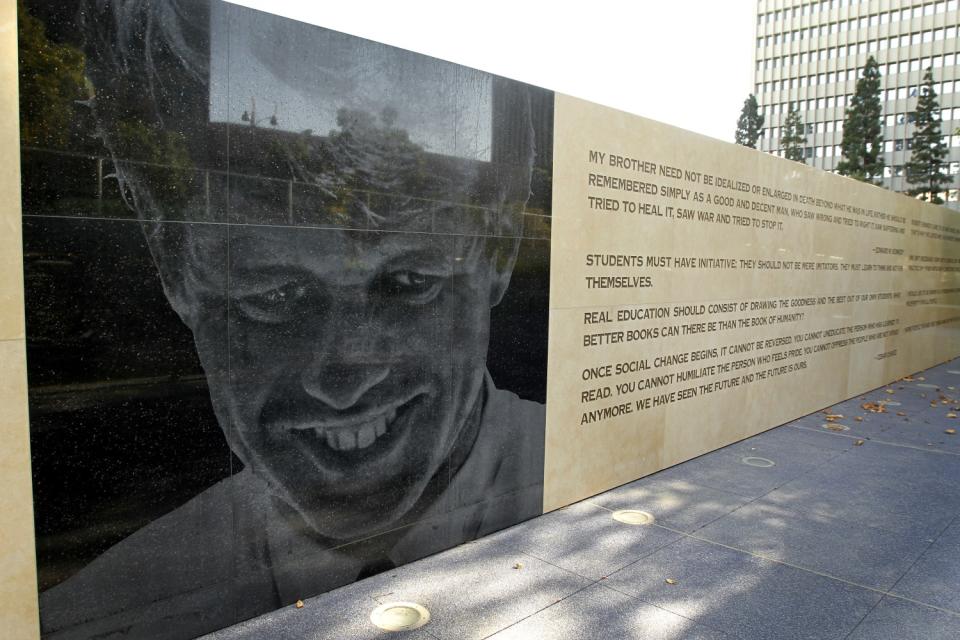
Conspiracy theories, new obsessions
On the 30th anniversary of the assassination, The Times published a look at how the assassination still reverberated. The story included efforts by Sirhan and his supporters for a new trial:
Sirhan and his supporters point to what they say is intriguing new ballistics evidence and say it could either clear Sirhan or at least implicate a second gunman. They are particularly captivated by forensic evidence suggesting that the bullets that killed Kennedy were fired at point-blank range, an important fact because witnesses say Sirhan did not get that close to the senator.
What’s more, they accuse the Los Angeles Police Department of wantonly mishandling and cavalierly destroying evidence. Some of Sirhan’s most aggressive backers go so far as to implicate the department in an active cover-up — making police accessories after the fact to one of the most traumatic criminal acts of the 1960s.
Other veterans of the period, however, say that they are confident the right man is spending his life behind bars for the crime.
“These conspiracy people have exhausted their remedies,” snorted Ed Davis, the retired LAPD chief who was a deputy chief at the time of the killing. “Immediately after the assassination, the conspiracy theorists came up with implausible hypotheses. The Board of Police Commissioners ... listened patiently for months and months but decided there was nothing to them.”
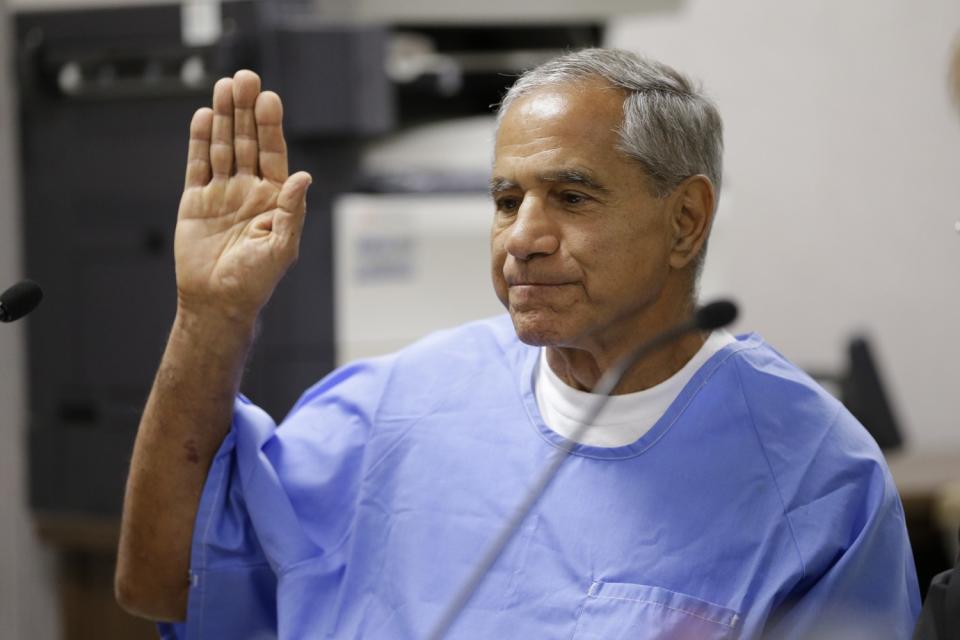
A new ally
On the 50th anniversary, RFK's son, Robert F. Kennedy Jr., emerged raising new theories and questions. "Although Sirhan was captured at the scene with a .22-caliber handgun in his hand and later admitted that he shot Kennedy, new evidence has emerged over the years that suggests there may have been as many as 13 shots fired that night. Sirhan’s gun held only eight bullets," The Times reported.
“I was disturbed that the wrong person might have been convicted of killing my father,” Kennedy told the Washington Post in 2018. “My father was the chief law enforcement officer in this country. I think it would have disturbed him if somebody was put in jail for a crime they didn’t commit.”
Authorities rejected Kennedy's claims.
“His comments are just way off base,” said Russell Iungerich, who worked as a deputy attorney general for the state of California when officials reopened the Kennedy case from 1975 to 1976.
“When you add up all the evidence produced at the hearings, there’s no way you can configure the evidence to say that there was a second gunman. RFK Jr. may believe this because he talked to Sirhan,” he said.
Sirhan had worked as a groom at Hollywood Park and he was kicked in the head by a horse which created some brain damage, Iungerich said, “and he had some delusional thinking about RFK.”
A long quest for freedom
Sirhan has repeatedly sought parole and has always been rejected.
In 2016, he lost his 15th quest for freedom, with the board saying Sirhan did not show adequate remorse or understand the enormity of his crime.
He was stabbed in a San Diego area prison in 2019.
He once suggested he simply be allowed to leave America. “The bottom line,” he told the Parole Board in 1987. “is why don’t you just deport me and get me out of your hair?”
Leaving his hearing that year, Sirhan was asked if he thought he would ever be free.
“The American system of justice,” he said, “will let me go home in a coffin. I’m abandoning hope.”
For the record:
9:54 a.m. Aug. 28, 2021: An earlier version of this story incorrectly described the parole review period. It is 120 days
This story originally appeared in Los Angeles Times.

